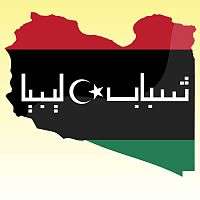Shabab Libya
Shabab Libya (alternatively written as shabablibya), also known as the Libyan Youth Movement (Arabic: حركة شباب ليبيا), or LYM for short, is a Libyan Facebook group started in February 2011 to spread awareness on planned protests (17 February) across the country. As the uprising began, the Libyan Youth Movement provided news, images and videos in real time across the world and acted as a unified voice for the Libyan people.
Harket Shabab Libya حركة شباب ليبيا | |
 | |
| Founded | 2 February 2011 |
|---|---|
| Type | Pressure group Political group |
| Focus | Democracy Social justice Free and fair election Civil resistance |
Area served | |
| Method | Social media |
| Website | shabablibya.org |
Members of the movement used Twitter as well as Facebook and YouTube to spread news from inside Libya throughout the revolution. As of February 2016, they have over 53,000 followers on their Facebook page and 201,000 followers on Twitter.
Background
The Libyan Youth Movement was founded by Omar Amer on 2 February 2011 in anticipation of a planned uprising on 17 February 2011. This quickly caught on as the only Libyan movement in the English language at that time.
The organisation had interviews with several major news outlets during the Libyan Civil War.[1][2]